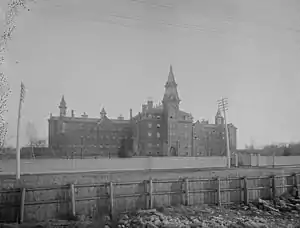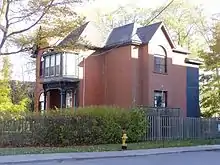Andrew Mercer Reformatory for Women
The Andrew Mercer Reformatory for Women was a women's (16 years of age or older) prison in Toronto, Canada. At various times, the facility was also known as the Mercer Complex, Andrew Mercer Reformatory for Females, and Andrew Mercer Ontario Reformatory for Females.[1]
 | |

| |
| Location | Toronto, Ontario |
|---|---|
| Status | Closed |
| Opened | 1872 |
| Closed | 1969 |
| Managed by | Jean Burrows (1950) |

History
Located on King Street West in Toronto, Ontario, it opened in 1872 with the idealistic promise of a "homelike" atmosphere for its inmates.
One of the major tenets of the reformatory was to instill feminine Victorian virtues such as obedience and servility.
Work, such as cooking, baking, and cleaning, was also a major part of prison life. According to one superintendent of the reformatory, "of all wretched women the idle are the most wretched. We try to impress upon them the importance of labour, and we look upon this as one of the great means of their reformation."[2]
By 1965 three institutions made up what was then referred to as the Mercer Complex: the Andrew Mercer Reformatory for Women in Toronto, the Ontario Women's Guidance Centre, and the Ontario Women's Treatment Centre, both in Brampton at what would become the Vanier Centre for Women in 1970.
The Treatment Centre, originally part of the reformatory in Toronto, was set up in 1955 for the treatment of alcoholism, drug addiction and psychiatric disorders. It was relocated to Brampton in 1963 and named the Ontario Women's Treatment Centre, also to become part of the Vanier Centre for Women. The Ontario Women's Guidance Centre opened in 1959 at the same site and concentrated on academic and vocational training.[1]
Under the Ontario Female Refuges Act, 1893-1964, any person, including any parent or guardian, could bring before a judge any female under the age of twenty-one years who was deemed unmanageable or incorrigible by the adult person, so that the judge could decide the female's fate.
At times the Mercer Reformatory also housed female offenders under age sixteen in a separate part of the building. These separate areas were distinctly known as the Industrial Refuge for Girls from 1880 to 1905 and the Ontario Training School for Girls from 1952 to 1960.
Inmates
"Under the Female Refuges Act, the province of Ontario from 1896-1964 arrested and jailed, without trial or appeal, females from 16 to 35 whom magistrates suspected of undesirable social behaviour -- i.e. being involved in interracial relationships or general promiscuity or having a child out of wedlock. Males were deemed "incorrigible" only for theft."[3] The Mercer Reformatory was one of the institutions they were sent to and where questionable medical experiments were performed on these women without their informed consent.
Constance Backhouse, a Canadian legal scholar and historian specializing in gender and race discrimination,[4] has presented cases related to the abuses inflicted on women in these institutions in many legal forums. Among these cases is that of Velma Demerson and Muriel Walker, two of the many women who were subjected to several involuntary medical procedures by a reformatory doctor, a leading eugenics practitioner searching for evidence of physical deficiencies contributing to the moral defectives of "unmanageable women".[4][5][6] After release she married the father of her child, a Chinese immigrant, which under the citizenship law of that period automatically annulled her Canadian citizenship. Velma was one of the only survivors who, 60 years after her incarceration at the Andrew Mercer Reformatory in 1939, received compensation from the Ontario government. She was 81 by then.[7] In 2004 she wrote a book about the events titled Incorrigible,[8] which is part of the Life Writing Series from Wilfrid Laurier University Press. In 2002 she was awarded the J.S. Woodsworth Prize for anti-racism by the New Democratic Party of Canada.[8] Then Muriel Walker a young woman working on a promising ballet career. She also was jailed under the female refuges act and charged with Incorrigible. Muriel was also subjected to medical experimentation while incarecerated. Senator Kim Pate and CBC helped get her son Robert Burke closure and recognition for his torture as an infant in the Andrew Mercer Reformatory. As a 4 month old child Robert was brutally beaten while being cared for by the matrons of the Andrew Mercer Reformatory.
Closure
Despite its promising beginnings, the Andrew Mercer Reformatory for Women would become the centre of controversy with allegations of torture, beatings, experimental drugs, and medical procedures, all in the name of reform.
In 1964, a grand jury was convened to investigate, and was brought to prominence by The Toronto Daily Star's front-page headline "Secret visit to Toronto dungeons: Girls' Jail Shocks Grand Jury".[9] The grand jury's conclusions included finding medical care so bad that "we could find no one with anything good to say about it."[9] The jury also found that the rehabilitation process was so nonexistent that "the name of the institution should be changed to jail, since it is in no sense a reform institution."[9] Dungeon-like basement "bucket cells" used for solitary confinement were 1.2 metres by just over 2 metres, with no windows or lights.[9]
Although the grand jury's report was challenged at the time by the Ontario Minister of Reform Institutions, Allan Grossman,[10] Toronto Star reporter Lotta Dempsey wrote that the paper's files were "full of stories of escapes from Mercer, harsh treatment of expectant mothers, riots", and more.[8] In early 1969, the reformatory was closed, officially replaced by the Vanier Centre for Women in Brampton, and then demolished later that year.[11][12]
Today, the site where the old reformatory existed is now the Alan Lamport Stadium.[13][14] All that structurally remains from the original site is the superintendent's house at the corner of King Street and Fraser Avenue (pictured in the Infobox above).
References
- Ontario Archives
- McCord Museum The Mercer Reformatory for Women
- Maggie Mortimer, review 5 Feb. 2005 in the Toronto Globe and Mail of Velma Demerson's memoir Incorrigible (Wilfrid Laurier University Press, 2004.)
- Ontario's Dark Reformatory Past (2013) Archived February 2, 2014, at the Wayback Machine TVO - The Agenda with Steven Paikin. Retrieved on February 3, 2014.
- "An Honest Woman". This Magazine. July–August 2005. Archived from the original on 2012-03-01. Retrieved 2014-02-03.
- "Lost Canadian Velma Demerson's tragic story of love and loss". The Vancouver Observer. 28 February 2011. Retrieved 2014-02-03.
- "Jailed as 'incorrigible' 60 years ago, woman wants compensation". CBC News. 7 October 2002. Retrieved 2014-02-03.
- Demerson, Velma (2004). Incorrigible. Waterloo, Ontario: Wilfrid Laurier University Press. ISBN 978-0-88920-444-7.
- Dempsey, Lotta (1964-11-05). "Secret visit to Toronto dungeon: Girls' Jail Shocks Grand Jury". The Toronto Daily Star (Night ed.). Toronto. pp. 1, 4.
- "Grossman Orders Probe Of Women's Jail Setup". The Globe and Mail. Toronto. 1964-11-06. pp. 1, 2.
- Weiers, Margaret (1969-01-08). "Vanier Women's Centre is like a private school". The Toronto Daily Star. Toronto. pp. 69, 74.
- McNenly, Pat (1969-12-11). "Historic Mercer reformatory falls under wrecker's hammer". The Toronto Daily Star. Toronto. p. 44.
- "Mercer site bought by city for park". The Toronto Star. Toronto. 1972-06-08. p. 29.
- "Stadium Named for Allan Lamport". The Toronto Star. Toronto. 1975-06-14. p. A8.